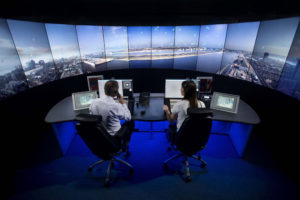
Last week I came across two peculiar stories dedicated to the role played by technology in the evolution of the civil aviation industry. While the stories were barely related to each other at first glance – and had I come across them at different points in time I probably would have never spot that huge connection between them – but luckily I was still thinking about the first story when I bumped into the second one, and immediate realisation of the scale of the apparent trend made quite an impression on me.
That first story was about the role of technology in the crash of Air France transatlantic flight 447 back in 2009. The primary conclusion from the investigation that the article elaborates on is that the pilots were so got used to flying with assistance of the autopilot that they became completely lost when they faced the need to fly the aircraft manually. They’ve just got no understanding of the situation whatsoever, as they’ve lacked the hands-on feel for flying the aircraft at cruise altitudes – something normally handled by the autopilot. In addition to that, the autopilot, designed with intelligence and pilot-friendliness in mind, didn’t warn the pilots that the aircraft was approaching a complete stall, after interpreting the way-too-sharply plummeting speed as an indicator of a probable false alarm.
Confused and lost, the pilots applied several corrective actions to get the aircraft back on its course. Unfortunately, due to the pilots’ lack of situational awareness, those actions had become fatal. The A330 lost its airspeed and crashed into the ocean, killing all 228 people on board. Ironically, the investigation had shown that should the pilots not intervene in the situation, AF447 would have continued at its cruise altitude as it should even with its autopilot switched off.
The second story I read was on a far more positive side, depicting prospective transition of the London City airport air traffic control tower from the airfield itself to a small place called Swanwick, Hampshire, some 80 miles away. Specifically, twelve HD screens and a thick communication channel are going to be used to replace the existing watch tower, and are claimed to provide far better insight into aircraft landings and take-offs performed at the airport, as well as a number of augmented reality perks. The experience of LCY is then expected to be picked up by other airports around the country, effectively making air traffic control tower operations an outsourced business.
The fact that impressed me the most about these two articles was that they both, despite being barely related per se, are essentially telling us the same story, the story of skills typically attributed to humans being taken over by technology. It’s just that the first article tells us about the end of the story, while the second one is rather at the very beginning of it.
Just like such advances in technology as the glass cockpit and way-too-smart autopilots led to pilots losing their grip in manual flying, switching to augmented HD view of the runway will inevitably lead to air traffic control operators losing their basic skills, like tuning binoculars or assessing meteorological conditions by a dozen of nearly subconscious cues. The trained sharpness of their eyes, now supported by HD zoom, will most certainly diminish. Sooner or later, the operators will be unable to manage the runway efficiently without being assisted by the technology.
And this is the challenge we are going to face in the near future. The more human activities typically referred to as ‘acquired skills’ are going to be taken over by technology and automation, the less able we are going to be about those skills ourselves. If a muscle isn’t constantly trained, it wears off. If a musician stops playing regularly, she eventually loses her skill to improvise. If a cook doesn’t dedicate as much time to cooking, his food loses its character, despite cooked from the same quality ingredients and using the same proportions.
And that’s not necessarily bad. As the technology is inevitably making its way to our lives, taking over those of our skills which it can perform better than we do, there is no reason not to embrace it – but embrace thoughtfully, realising the consequences of us losing grip on them. Remember that we had lost a big deal of our skills to the past already. Your great-grandfather is very likely to had been particularly good in fox hunting, your grandad probably performed much better than you in fly fishing, and certainly a much wider proportion of population were capable in horse riding two centuries ago than it is today. Those skills had been taken away from us by technology and general obsolescence, but do we really need them today?
What we need though is to have a clear understanding of the consequences of sharing activities we got used to do with technology, and be prepared to observe a steep decline in the quality of our own respective hand skills as technology gradually takes them over. Understanding that problem alone and taking our imperfect human nature as it is will most certainly help us manage the risks around technological advances more efficiently.
(pictured: a prototype of the digital control room at NATS in Swanwick, credit: NATS)